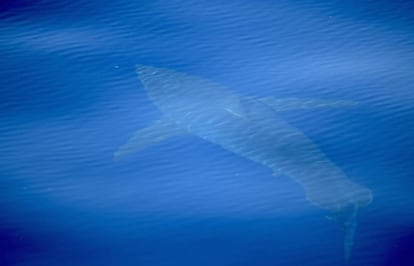Great white shark appears in waters of Balearic Islands for first time in 30 years
Marine conservation expedition releases up-close footage of the specimen, which was sighted off the coast of Cabrera


In the waters of the Balearic Islands, eight miles off the coast of the island of Cabrera, a scientific expedition called Alnatik has managed to shoot 70 minutes of footage of a five-meter-long great white shark. It marks the first confirmed appearance in Spanish waters of the Carcharodon Carcharías, as the species is known, for 30 years. Previous reports in the last three decades have been limited to rumors and sightings without evidence.
The Alnitak conservation organization made its historic finding public via a post on its Facebook page. The sighting occurred on Thursday, June 28, during an expedition headed up by biologist Ricardo Sagarminaga. He embarked on his mission accompanied by fellow biologist and documentary director Fernando López-Mirones and a team of 10 people from five different countries.
“We saw a black fin and straight away could see it was a very big shark,” explains López-Mirones, still overcome by the excitement of the sighting. “The conditions in the sea were amazing and we had the specimen around three meters from the boat, and we could watch it up close for 70 minutes.”
This shark would not come close to the coast and it doesn’t eat humans. We do not make up part of its menu
Documentary director Fernando López-Mirones
The species is the same as the one that lives in the waters of Australia, New Zealand and South Africa, “but they are different populations,” according to the biologist. When in the Mediterranean, the shark’s diet is based on red tuna. “This shark would not come close to the coast and it doesn’t eat humans. We do not make up part of its menu,” López-Mirones insists.
The white shark is not unknown in the Balearic Islands, although the last recorded capture of one was in 1976. A 2007 documentary by journalist Juan Andrés Ruiz about the history of this species in the waters of Mallorca estimated that local fishermen had caught 27 of these creatures between 1920 and 1976.
The finest specimen of these, and the last of which there is evidence, was caught in 1976 by fisherman Xisco López, who came by a more than six-meter shark in the area of Cape Farrutx. Seven years earlier, the fisherman Guillem Ferragut caught another six-meter specimen after it found its way into his tuna fish farm at Bahía Azul, located to the south of the island. During the following decades in areas off the coast of the Balearics, the remains of dead cetaceans were found presenting bites that suggested the great white was still around.
The Alnatik expedition was conducted in the surroundings of the Cabrera National Park and was carried out as part of the Librera program. Run by the ecological organization SEO Birdlife in collaboration with Ecoembes, this project seeks to raise awareness of the need to maintain areas of natural conservation and keep them free of trash. In the last weeks the expedition has collected data on sea turtles, sperm whales, dolphins, red tuna and ray fish. They have also gathered information on the presence of plastic microfibers in the sea.
English version by John Clarke.
Tu suscripción se está usando en otro dispositivo
¿Quieres añadir otro usuario a tu suscripción?
Si continúas leyendo en este dispositivo, no se podrá leer en el otro.
FlechaTu suscripción se está usando en otro dispositivo y solo puedes acceder a EL PAÍS desde un dispositivo a la vez.
Si quieres compartir tu cuenta, cambia tu suscripción a la modalidad Premium, así podrás añadir otro usuario. Cada uno accederá con su propia cuenta de email, lo que os permitirá personalizar vuestra experiencia en EL PAÍS.
¿Tienes una suscripción de empresa? Accede aquí para contratar más cuentas.
En el caso de no saber quién está usando tu cuenta, te recomendamos cambiar tu contraseña aquí.
Si decides continuar compartiendo tu cuenta, este mensaje se mostrará en tu dispositivo y en el de la otra persona que está usando tu cuenta de forma indefinida, afectando a tu experiencia de lectura. Puedes consultar aquí los términos y condiciones de la suscripción digital.








































